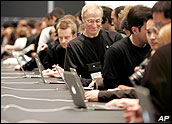
Rest at ease: Physicists say fears over a powerful atom smasher leading to the end of the Earth are completely unfounded. A group of critics of the Large Hadron Collider — a machine built 330 feet underground in Europe — filed a lawsuit to try to stop its initialization. They worried the collider’s operation could create black holes that would swallow up the planet. These worries, scientists say, border on absurdity.
The government agrees, too: Just last week, the U.S. Justice Department filed a motion to stop the lawsuit. The LHC is scheduled to start its initial test runs in August. Physicists say the process will be absolutely unharmful — and could lead to discoveries that are nothing short of astonishing.
The New Frontier
Buried deep below the France-Switzerland border, the LHC will collide particles at very high energies. The goal is to try to track down new subatomic particles that could reveal unknown details about our universe.
“It really represents the frontier in elementary physics research,” Steve Giddings, professor of physics at UC Santa Barbara, told TechNewsWorld. “We’re expecting that it could reveal new things about the structure of matter. We might see extra dimensions of space revealed to us and could learn about the forces of nature,” he said.
As with any experiment, the LHC focuses on the unknown — which may have led to the recent speculation about its safety.
“Because this facility is pushing the edge of knowledge, there is uncertainty about what will be found,” W. Nielsen Brandt, professor of astronomy and astrophysics at Pennsylvania State University, told TechNewsWorld.
“There is one type of theory that suggests that if the universe is a certain way, it may be possible to create small black holes at much lower energies than might have been expected,” he explained.
Black Hole Happenings
There is a possibility — albeit a remote one — that those types of small black holes could be created by the LHC. Even if that did happen, scientists say, those holes would pose no danger to anyone.
“We know that there are cosmic rays striking the earth’s atmosphere all the time,” Brandt said. “Some of these cosmic rays have far more energy than anything that is going to be created in the LHC — so if the LHC were going to create mini-black holes that were going to grow somehow and swallow up the Earth, this would have happened long ago naturally.”
Ultimately, the LHC is reproducing processes already occurring — it’s just doing it in a controlled, rather than a random, environment.
“I’m not aware of any way the LHC is somehow going out in a new direction that has not already been done by nature,” Brandt noted.
Layers of Safety
There are even more layers of safety beyond the natural occurrences, too — one of which comes from basic physics laws first noted by Stephen Hawking.
“People might initially think the idea of those black holes is disconcerting, but what they don’t realize is that they are governed by the laws of quantum mechanics,” said Giddings, who just published new research on the particle collider’s safety this week. “As Hawking first realized quite some time ago, basic quantum physics implies that [the black holes] just temporarily flash into existence and then vanish in an extremely tiny fraction of a second.”
All these factors combine into a secure scenario that is leading to surprise within the scientific community over the misguided concern.
“To start with, it’s a long shot that we’re going to produce black holes at all. Basic quantum physics implies that if there were any of these black holes, they’d vanish almost instantaneously — so this notion that there could be stable ones is an extremely bizarre scenario,” Giddings told TechNewsWorld.
“It’s remarkable how much it’s been played up,” he added.
The worry strikes some as a simple misunderstanding of the processes at play. Most physicists say they won’t even take the claims seriously because they are so unrealistic.
“I think these concerns grew out of not having a full understanding of everything that has occurred in nature naturally,” Brandt said. “I’m able to sleep comfortably at night not worrying we’re about to be swallowed up by a black hole once they turn the LHC on,” he laughed.





















































